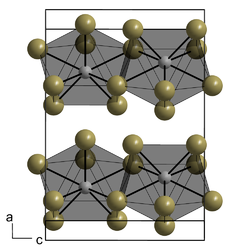Praseodymium(III) iodide
 | |
| Names | |
|---|---|
| Other names Praseodymium triiodide | |
| Identifiers | |
3D model (JSmol) | |
| ChemSpider | |
| ECHA InfoCard | 100.034.046 |
| EC Number |
|
PubChem CID | |
CompTox Dashboard (EPA) | |
| |
| |
| Properties | |
| PrI3 | |
| Molar mass | 521.619 g/mol 683.75652 g/mol (nonahydrate) |
| Appearance | hygroscopic green crystals |
| Density | 5.8 g/cm3[1] |
| Melting point | 738 °C (1,360 °F; 1,011 K)[1] |
| Boiling point | 1,380 °C (2,520 °F; 1,650 K) |
| 213.9 g/100 mL[2] | |
| Hazards | |
| GHS labelling:[3] | |
  | |
| Danger | |
| H317, H360 | |
| P203, P261, P272, P280, P302+P352, P318, P321, P333+P313, P362+P364, P405, P501 | |
| Related compounds | |
Other anions | Praseodymium(III) fluoride Praseodymium(III) chloride Praseodymium(III) bromide |
Other cations | Cerium(III) iodide Neodymium(III) iodide |
Except where otherwise noted, data are given for materials in their standard state (at 25 °C [77 °F], 100 kPa). | |
Praseodymium(III) iodide is an inorganic salt, consisting of the rare-earth metal praseodymium and iodine, with the chemical formula PrI3. It forms green crystals.[4] It is soluble in water.[5]
Preparation
[edit]- It can also be obtained by heating praseodymium with mercury(II) iodide:[6]
Properties
[edit]Praseodymium(III) iodide forms green crystals, which are soluble in water.[5] It forms orthorhombic crystals which are hygroscopic.[1] It crystallizes in the PuBr3 type[6][7] with space group Cmcm (No. 63) with a = 4.3281(6) Å, b = 14.003(6) Å and c = 9.988(3) Å.[8] It decomposes through an intermediate phase 2 PrI3·PrOI to a mixture of praseodymium oxyiodide and praseodymium oxide (5 PrOI·Pr2O3).[9]
Reactions
[edit]- PrI3 forms compounds with hydrazine, like I3Pr·3N2H4·4H2O which has pale yellow crystals and soluble in methanol, slightly soluble in water, and insoluble in benzene, d20 °C = 2.986 g/cm3.[10]
- PrI3 forms compounds with thiourea, like I3Pr·2CS(NH2)2·9H2O which is a green crystal with d = 2.27 g/cm3.[5][12]
- Praseodymium(III) iodide forms a nonahydrate, PrI3·9H2O. It can be obtained by dissolving praseodymium(III) oxide in concentrated aqueous hydroiodic acid:
- Pr2O3 + 6 HI + 15H2O → 2 PrI3·9H2O
- It adopts the same structure as other light rare earth iodides (La–Ho) and contains a triangular tricapped prismatic nonaaqua ion [Pr(OH2)9]3+ and iodide counterions.[4]
- Praseodymium(III) iodide reacts with praseodymium metal at elevated temperatures to form praseodymium diiodide:[13]
- 2 PrI3 + Pr → 3 PrI2
See also
[edit]References
[edit]- ^ a b c d Haynes, William M. (2016-06-22). CRC Handbook of Chemistry and Physics. CRC Press. pp. 2016–2652. ISBN 978-1-4987-5429-3.
- ^ Solubility_Table_Zh.PDF_version.pdf
- ^ "Praseodymium triiodide". pubchem.ncbi.nlm.nih.gov.
- ^ a b Timofte, T.; Babai, A.; Meyer, G.; Mudring, A.-V. (2005). "Praseodymium triiodide nonahydrate". Acta Crystallogr. E. 61 (6): i94 – i95. Bibcode:2005AcCrE..61I..94T. doi:10.1107/S1600536805012857.
- ^ a b c "Solubility_Table_Zh" (PDF). 27 August 2016.
- ^ a b Asprey, L. B.; Keenan, T. K.; Kruse, F. H. (1964). "Preparation and Crystal Data for Lanthanide and Actinide Triiodides". Inorg. Chem. 3 (8): 1137–1141. doi:10.1021/ic50018a015.
- ^ Wells, A. F. (1984). Structural Inorganic Chemistry (5th ed.). Oxford University Press. p. 421. ISBN 978-0-19-965763-6.
- ^ E. Warkentin, H. Bärnighausen (1979), "Die Kristallstruktur von Praseodymdiiodid (Modifikation V)", Zeitschrift für anorganische und allgemeine Chemie (in German), vol. 459, no. 1, pp. 187–200, doi:10.1002/zaac.19794590120
- ^ Heiniö, Outi; Leskelä, Markku; Niinistö, Lauri; Tuhtar, Dinko; Sjöblom, Johan; Strand, T. G.; Sukhoverkhov, V. F. (1980). "Structural and Thermal Properties of Rare Earth Triiodide Hydrates". Acta Chemica Scandinavica. 34a: 207–211. doi:10.3891/acta.chem.scand.34a-0207. ISSN 0904-213X.
- ^ Uchenye zapiski: Serii︠a︡ khimicheskikh nauk (S.M. Kirov adyna Azărbai̐jan Dȯvlăt Universiteti; 1977), trang 37. Truy cập 1 tháng 1 năm 2021.
- ^ Russian Journal of Inorganic Chemistry, Tập 18,Phần 2 (British Library Lending Division with the cooperation of the Royal Society of Chemistry, 1973), trang 1655. Truy cập 1 tháng 1 năm 2021.
- ^ Villars, Pierre; Cenzual, Karin; Gladyshevskii, Roman (24 July 2017). Handbook of Inorganic Substances 2017. Walter de Gruyter GmbH & Co KG. p. 5090. ISBN 978-3-11-043655-6.
- ^ Gerlitzki, Niels; Meyer, Gerd; Mudring, Anja-Verena; Corbett, John D. (2004). "Praseodymium diiodide, PrI2, revisited by synthesis, structure determination and theory". J. Alloys Compd. 380 (1–2). Elsevier BV: 211–218. doi:10.1016/j.jallcom.2004.03.046. ISSN 0925-8388.


 French
French Deutsch
Deutsch
